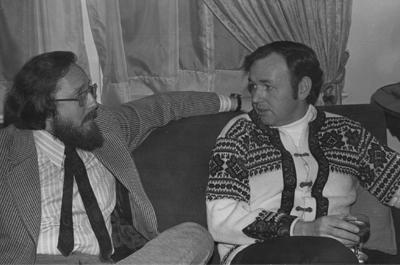Memories: Frederick Pond Ferre

Frederick Ferre (left) and Merle Allshouse were close colleagues in the former Department of Philosophy & Religion. Photo courtesy of Archives & Special Collections.
by Merle F. Allshouse, former associate professor of philosophy and associate academic dean
Former professor of philosophy Frederick Ferre died on March 29. Below is a tribute by colleague Merle F. Allshouse, former associate professor of philosophy and associate academic dean (1967-70).
Frederick Ferre’s trilogy, Being and Value (1996), Knowing and Value (1998) and Living and Value (2001) met the daunting challenge of his fellow philosopher, Paul Weiss, who passed away before he had an opportunity to read Frederick’s comprehensive work. Weiss challenged philosophers to:
“[B]ecome at once more bold and humble, more catholic and cautious, freer and more disciplined than before. For too long a time prejudice has been allowed to narrow our perspectives; for too long a time impatience has made us receptive to ideals and values not adequate to our full being and the world. We need a new viable systematic philosophy which is alert to the basic questions raised by the various sciences, by metaphysics and theology, by history and the arts, if we are to remain intellectually abreast of the world in which we live.”
One need not be a professional philosopher to appreciate and experience the complexity and depth of values revealed in Frederick’s life. His life itself was a metaphor for his philosophy and was found in the values of his friendships, teaching, writing, music, acting and so much more.
Frederick’s friendship was in many forms. He was an uber mensch. He knew me as a person, colleague and flight instructor. Being his friend made one more aware of the complex contexts of life we had experienced together. It was a friendship that grew more rich and intense with time, yet aged well. He brought possibilities for the future.
Frederick was a master teacher; he was always teaching, in one form or another. As my first department chairman he mentored me through those first years of teaching. He brought insight with understanding, rigor with compassion, historical precision with creativity, and passion with fairness. As a flight instructor he was thorough about all the weather briefings, always checked by personal observations; the preflight procedures were always followed; our destination always had an alternative landing site. Once while flying through an ozone layer in an embedded thunder storm, with water leaking in through the windshield he simply said; “you keep the wings straight and level, and I’ll handle the radio work.” He was precise, clear and calming. Academic administration, for Frederick, was another form of teaching. His voice at faculty meetings was strong and often spoke for reconciliation of contradictory view points. He had a skill for moving institutions between the Scylla of tradition and the Charybdis of novelty for their own sakes. Above all, he listened deeply. We all knew that and are better for it.
Frederick wrote with words as some gifted dancers perform. The reader never gets lost, for the context is never the meaning itself but rather way stations for further reflection, often leading to the synthesis of ideas. The rhythm is frequently a movement from historical context to issue clarification to logical analysis to alternatives to synthesis, often in novel territory.
Frederick’s base and his love of music was another dimension of experience filled with values and felt in the complexity of beauty. To play the bass, as he did in orchestras, one must listen carefully as other instruments explore themes that are grounded in the vibrations of the bass. What emerges is a synthesis experienced as novel beauty.
Frederick knew some only in his thespian life. He loved acting, for to become a role required transforming one persona into another. The “other” must have a history, a context and a psyche to be given a voice and become a real actor in the history of the play. That complete transformation, when appreciated by the audience, is felt as the joy of beauty.
Frederick considered institutions essential for the development of our cultural values, especially those that promoted human freedoms and respect for our environment.
There were so many more dimensions of Frederick’s experience that others knew better than I. The parts I knew will stay with me because they have become part of my personal history. They now live in the reintegration of new experiences and periodic moments of intense beauty.
I am deeply grateful for Frederick’s life.
Published July 24, 2013